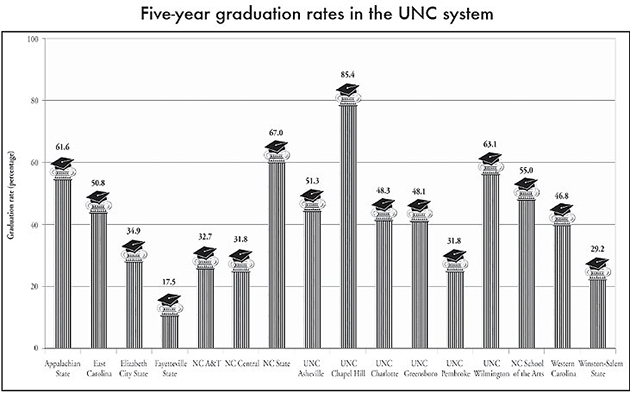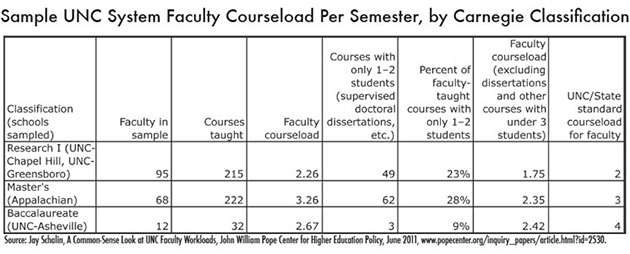Publisher's note: Agenda 2012 is the John Locke Foundation's charge to make known their wise political agenda to voters, and most especially candidates, with our twenty-third instalment being "Higher Education Policy," written by Dr. Terry Stoops, Director of Education Studies at the John Locke Foundation. The first installment was the "Introduction" published here.
North Carolina takes great pride in her university system. Nevertheless, the persisting recession is affecting all aspects of the state's economy, including UNC and its students. People who enrolled in UNC schools just a few years ago now face a daunting duo of uncertain job prospects and very real student loan payments.
For years thoughtful critics inside and outside academe have warned that too many students aren't academically engaged, too many courses and degree programs offer "brain candy" and fail to impart useful knowledge, too many students drop out or need six-plus years to earn a four-year degree, and all of the above leave too many with heavy loan debts but little to nothing to show for it.
Key Facts
• UNC schools appear to be raising enrollment standards. Higher standards help channel students to better academic fits, decreasing dropouts, student disengagement, and major-switching to less-intense fields.
• Better quality instruction would also help decrease negative student outcomes, but research pressures incentivize universities to limit professors' instruction time, leaving more undergraduate teaching duties in the hands of graduate students.
• A 2011 study found UNC faculty instructional workloads falling below state standards. Worse, a sizeable proportion of courses taught by faculty enrolled only one or two students.
• From 1993 to 2010, the number of administrative and professional (i.e., noninstructional) staff per 100 students in UNC system schools grew by 67 percent.
• Nearly two-thirds of N.C. high school graduates enrolled in community colleges required one or more remedial courses in math, English, or reading.
• A recent Bloomberg Businessweek study of return on investment in higher education ranked North Carolina 42nd among state university systems. There is no way at present to determine how much educational value a student gets from his time in a UNC school.
• Need-based financial aid offered by the state is on the increase, including need-based aid to students at private institutions in the state. Those programs currently include no consideration of whether the recipient can handle university-level coursework.
• A 2010 Supreme Court decision in CLS v. Martinez essentially, allows universities to apply nondiscrimination codes against student religious groups so that, instead of hailing a diversity of student groups, schools would enforce ideology conformity within each. UNC-Chapel Hill has a history of trying to subvert campus religious groups with just such a tactic (see Alpha Iota Omega Christian Fraternity v. Moeser, 2006).
• There is a worrisome trend in academia to require students to adopt ideological, anti-religious doctrine as a prerequisite to obtaining a degree in certain disciplines such as social work, counseling, and nursing.
• In response, legislators in Ohio and Tennessee have passed bills to protect religious liberty on campus.
• The North Carolina Constitution contains an arguably stronger protection of religious liberty than does the First Amendment to the U.S. Constitution.
Recommendations
Cut costs responsibly, without harming the universities' primary mission of educating students:
Throttle back noninstructional staff.
Provide stricter enrollment standards for more academically prepared students and have community
colleges offer remedial education. (Public schools must address the other side of this equation.)
Add merit components for need-based aid.
Enable schools to deliver education more effectively:
Raise faculty instructional workloads.
Relax research and publication standards, especially in less research-intensive disciplines such as
humanities and social sciences, to allow faculty more time for teaching.
Seek and means-test ways to measure educational value added at the university or department level.
Return to a more rigorous core curriculum and pare back on ancillary "candy" courses.
Uphold religious liberty and free association on campus.
Require public universities to be transparent in their finances as well as course syllabi.
Analyst: Dr. Terry Stoops
Director of Education Studies
919-828-3876 •
tstoops@johnlocke.org




